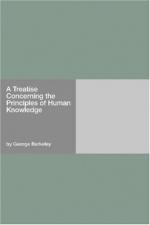[Note: Vide sect. iii. and xxv.]
8. Objection.—Answer.—But, say you, though the ideas themselves do not exist without the mind, yet there may be things like them, whereof they are copies or resemblances, which things exist without the mind in an unthinking substance. I answer, an idea can be like nothing but an idea; a colour or figure can be like nothing but another colour or figure. If we look but never so little into our thoughts, we shall find it impossible for us to conceive a likeness except only between our ideas. Again, I ask whether those supposed originals or external things, of which our ideas are the pictures or representations, be themselves perceivable or no? If they are, then they are ideas and we have gained our point; but if you say they are not, I appeal to any one whether it be sense to assert a colour is like something which is invisible; hard or soft, like something which is intangible; and so of the rest.
9. The philosophical notion of matter involves A contradiction.—Some there are who make a distinction betwixt primary and secondary qualities. By the former they mean extension, figure, motion, rest, solidity or impenetrability, and number; by the latter they denote all other sensible qualities, as colours, sounds, tastes, and so forth. The ideas we have of these they acknowledge not to be the resemblances of anything existing without the mind, or unperceived, but they will have our ideas of the primary qualities to be patterns or images of things which exist without the mind, in an unthinking substance which they call matter. By matter, therefore, we are to understand an inert, senseless substance, in which extension, figure, and motion do actually subsist. But it is evident from what we have already shown, that extension, figure, and motion are only ideas existing in the mind, and that an idea can be like nothing but another idea, and that consequently neither they nor their archetypes can exist in an unperceiving substance. Hence, it is plain that that the very notion of what is called matter or corporeal substance, involves a contradiction in it.[Note.]
[Note: “Insomuch that I should not think it necessary to spend more time in exposing its absurdity. But because the tenet of the existence of matter seems to have taken so deep a root in the minds of philosophers, and draws after it so many ill consequences, I choose rather to be thought prolix and tedious, than omit anything that might conduce to the full discovery and extirpation of the prejudice.”—Edit 1710.]




